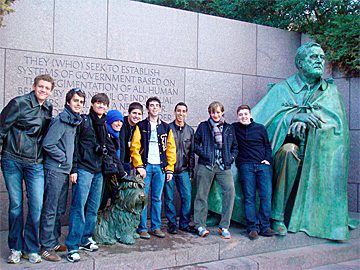“I don’t know if America has a leadership problem;
it certainly has a followership problem.”
So writes New York Times columnist David Brooks in his recent column, “The Follower Problem.” According to Brooks, “To have good leaders you have to have good followers — able to recognize just authority, admire it, be grateful for it and emulate it.” But we don’t have good followers today, and this is a significant problem.
Brooks gets into his subject from a most unexpected direction: the changing “feel” of monuments in Washington D.C. That’s right, monuments:
If you go to the Lincoln or Jefferson memorials in Washington, you are invited to look up in admiration. Lincoln and Jefferson are presented as the embodiments of just authority. They are strong and powerful but also humanized. Jefferson is a graceful aristocratic democrat. Lincoln is sober and enduring. Both used power in the service of higher ideas, which are engraved nearby on the walls.
The monuments that get built these days are mostly duds. That’s because they say nothing about just authority. The World War II memorial is a nullity. It tells you nothing about the war or why American power was mobilized to fight it. The Rev. Dr. Martin Luther King Jr. memorial brutally simplifies its subject’s nuanced and biblical understanding of power. It gives him an imperious and self-enclosed character completely out of keeping with his complex nature.

As Michael J. Lewis of Williams College has noted, the Franklin Delano Roosevelt Memorial transforms a jaunty cavalier into a “differently abled and rather prim nonsmoker.” Instead of a crafty wielder of supreme power, Roosevelt is a kindly grandpa you would want to put your arm around for a vacation photo.
Our squeamishness about monuments that celebrate leadership reflects, according to Brooks, a strong anti-authoritarian current in our culture:
Why can’t today’s memorial designers think straight about just authority?
Some of the reasons are well-known. We live in a culture that finds it easier to assign moral status to victims of power than to those who wield power. Most of the stories we tell ourselves are about victims who have endured oppression, racism and cruelty.
Then there is our fervent devotion to equality, to the notion that all people are equal and deserve equal recognition and respect. It’s hard in this frame of mind to define and celebrate greatness, to hold up others who are immeasurably superior to ourselves.
But the main problem is our inability to think properly about how power should be used to bind and build. Legitimate power is built on a series of paradoxes: that leaders have to wield power while knowing they are corrupted by it; that great leaders are superior to their followers while also being of them; that the higher they rise, the more they feel like instruments in larger designs. The Lincoln and Jefferson memorials are about how to navigate those paradoxes.
Brooks suggests that we need to “relearn the art of following”:
Democratic followership is also built on a series of paradoxes: that we are all created equal but that we also elevate those who are extraordinary; that we choose our leaders but also have to defer to them and trust their discretion; that we’re proud individuals but only really thrive as a group, organized and led by just authority.
I agree with Brooks. But I wonder how we do this. I don’t think it’s a matter of simply deciding to be good followers. It seems to me that good followership can only be nurtured in the context of institutions, institutions that value leadership and that are led by honorable leaders. But, I suppose a case could be made for the power of a different kind of monuments to shape our broader cultural understanding of power and authority.















